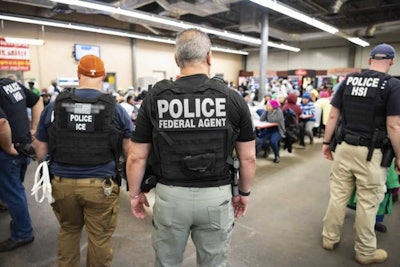
Federal immigration officials say there is probable cause that the poultry companies who had plants raided on August 7 by authorities from U.S. Immigration and Customs Enforcement (ICE) broke the law by knowingly hiring undocumented immigrants, according to recently unsealed search warrant affidavits.
Of the seven facilities raided, three were operated by Peco Foods, the eighth largest poultry company in the United States, and another was operated by Koch Foods, the fifth largest broiler company in the country. Other companies with facilities targeted in the raid were PH Food, A&B and Pearl River Foods, according to a Washington Post report. All facilities are in Mississippi.
According to a Washington Post report, the search warrants allege the company hired workers who wore ankle monitors as they awaited deportation hearings, as well as employed people who gave Social Security numbers belonging to people who were deceased, and hired the same person twice despite the worker using different names when applying each time.
At the present time, none of the companies or any of their management teams have been charged with violation of federal immigration law.
In the raids, a total of 680 people were arrested, however, ICE officials, one day after the raids stated that 303 people were released. About 30 of those were released for humanitarian reasons, while the remainder were processed by ICE, then released.
Peco Foods told the Post it was "fully cooperating with the authorities," and is "navigating a potential disruption of operations."
In a statement on its website, Koch Foods said “tension exists between federal laws on preventing discrimination, such as national origin discrimination, and immigration laws on verifying employment eligibility.’
“Federal law prohibits an employer from requesting during the employment verification process more documents than the employee presents when the employee presents documents that appear authentic. Requesting more documents subjects an employer to liability for "over documentation" discrimination. Similarly, an employer would commit unlawful national origin discrimination if it refused to hire a worker on the basis that the worker comes from another country if the worker presents what appear to be authentic documents. Furthermore, the E-Verify system does not detect if a worker is working under a stolen identity of an authorized person,” the company stated.
“The net effect of all of this is that an employer like Koch Foods can dutifully and vigilantly comply with the immigration laws and still not know if some of its workers are unauthorized.”
After the poultry plant raids, the National Chicken Council (NCC) wrote a letter to President Donald Trump, Senate Majority Leader Mitch McConnell, Senate Minority Leader Chuck Schumer, Speaker of the House Nancy Pelosi and House Minority Leader Kevin McCarthy, urging the government leaders to help the poultry industry to better prevent the hiring of illegal immigrants by providing a more reliable verification method.
“The U.S. chicken industry uses every tool available to verify the identity and legal immigration status of all prospective employees,” the letter, signed by NCC President Mike Brown read. “Unfortunately, the government does not provide employers with a reliable verification method to prevent identity fraud and document falsification and confirm with confidence that new hires are legally authorized to work in the United States.”
















